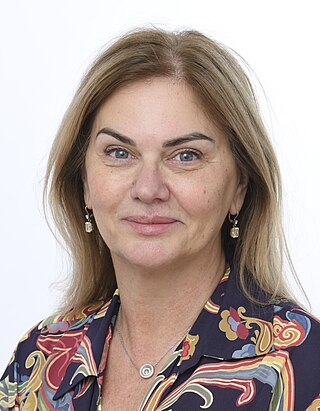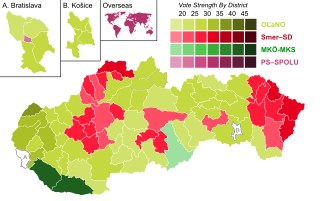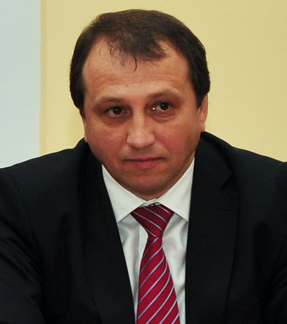Politics of Slovakia takes place in a framework of a parliamentary representative democratic republic, with a multi-party system. Legislative power is vested in the parliament and it can be exercised in some cases also by the government or directly by citizens.

The Communist Party of Slovakia is a communist party in Slovakia, formed in 1992 through the merger of the Communist Party of Slovakia – 91 and the Communist League of Slovakia.

The Slovak Democratic and Christian Union – Democratic Party is a liberal-conservative, Christian-democratic political party in Slovakia. The SDKÚ-DS was a member of the Centrist Democrat International and was a member of the European People's Party until 2018, when it was expelled due to inactivity.

Direction – Social Democracy, also commonly referred to as Smer, is a left-wing nationalist and left-wing populist political party in Slovakia led by the incumbent prime minister Robert Fico. The party identifies as social-democratic, and was described as a combination of "leftist economics and nationalist appeal".

Monika Beňová is a Slovak politician who has been a member of the European Parliament since 2004. She is a member of the centre-left Direction-Social Democracy party SMER-SD. SMER-SD is a member of the Party of European Socialists. She presently serves on the Committee on the Environment, Public Health and Food Safety. At the same time she serves as a Quaestor of the European Parliament and therefore she is a member of the European Parliament's Bureau. In present she has opposite views as her mother party - Smer, for example on European Union, NATO, LGBTQ rights in Slovakia, conflict in Ukraine and so on.

The Movement for Democracy was a political party in Slovakia created in 2002 when it split from the Movement for a Democratic Slovakia. From 2002 to 2004 the first leader of the party was Ivan Gašparovič, who served as president of Slovakia from 2004 to 2014. The leader since 2004 was Jozef Grapa.

Most–Híd 2023 is an inter-ethnic political party in Slovakia. Its programme calls for greater cooperation between the country's Hungarian minority and ethnic Slovak majority. It was one of four parties in the Fico III government coalition, but lost all its seats in the National Council in the 2020 Slovak parliamentary election.

Maroš Šefčovič is a Slovak diplomat and politician serving as Executive Vice-President of the European Commission for the European Green Deal since 2023, as well as Vice-President of the European Commission for Interinstitutional Relations since 2019, previously holding the office from 2010 to 2014. He has been member of the European Commission since 2009. Šefčovič also stood for office in the 2019 Slovak presidential election, which he lost against Zuzana Čaputová.

Presidential elections were held in Slovakia on 15 March 2014, with a second round on 29 March 2014.

The Party of Civic Understanding was a centre-left political party in Slovakia between 1998 and 2003. Between 1998 and 2002 the party was part of the coalition government led by Mikuláš Dzurinda, with the founder of the party, Rudolf Schuster, being elected President of Slovakia in 1999.

Peter Pellegrini is a Slovak politician who is currently serving as the sixth president of Slovakia since 2024. He previously served as prime minister of Slovakia from 2018 to 2020.

Parliamentary elections were held in Slovakia on 5 March 2016 to elect the 150 members of the National Council. The ruling left-wing populist Direction – Social Democracy (SMER–SD) party remained the strongest party, but lost its majority. The Slovak Democratic and Christian Union – Democratic Party (SDKÚ-DS), which led the government between 2000–06 and 2010–12, was defeated heavily, failing to cross the electoral threshold and losing its representation in the National Council. The centre-right Christian Democratic Movement (KDH) also failed to cross the threshold for the first time since 1990, whilst the far-right nationalist Kotleba – People's Party Our Slovakia (ĽSNS) entered parliament for the first time.

The Carpathian German Party was a political party in Czechoslovakia, active amongst the Carpathian German minority of Slovakia and Subcarpathian Rus'. It began as a bourgeois centrist party, but after teaming up with the Sudeten German Party in 1933 it developed in a National Socialist orientation.

Parliamentary elections were held in Slovakia on 29 February 2020 to elect all 150 members of the National Council.
Arbeitsfront der Volksdeutschen in der Slowakei was an organization of ethnic German workers in World War II Slovakia. A.d.V. was modelled after the German Labour Front (D.A.F.) in the German Reich. A.d.V. was formed on November 26, 1940, replacing the previous German Trade Unions in Slovakia. A.d.V. leaders were trained at the D.A.F. training centre in Schwechat.
Pavol Pavlis is a Slovak politician affiliated with the Direction - Social Democracy (SMER-SD) party. His political career dates from 2006 with an alternate work in the Slovak legislature and in the state administration of the Slovak Republic.

Progressive Slovakia is a liberal and social-liberal political party in Slovakia established in 2017. The party is led by Michal Šimečka, a former Vice President of the European Parliament. It is a member of the Renew Europe group and is a full member of the Alliance of Liberals and Democrats for Europe Party. PS has three MEPs: Michal Šimečka, Martin Hojsík, and Michal Wiezik ; the latter left the EPP and Democrats to join PS.
In the run up to the 2023 Slovak parliamentary election, various organisations carried out opinion polling to gauge voting intention in Slovakia. Results of such polls are displayed in this article. The date range for these opinion polls are from the previous parliamentary election, held on 29 February 2020, to September 30th, 2023.

Jozef Burian was a Slovak politician. A member of Direction – Slovak Social Democracy, he served in the National Council from 2002 to 2020. He died on 24 December 2021, at the age of 60.















